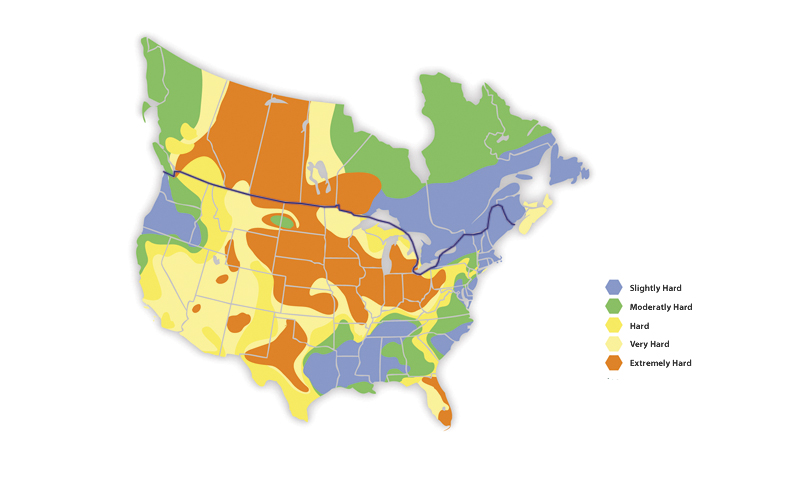Hard Water in Manitoba and NW Ontario
A glass of water. It looks crystal clear. It has no odour. Is the water in the glass hard or soft? Most wouldn’t know without testing it. However, hard water in Manitoba and NW Ontario is the norm.

How It Forms
As moisture accumulates in clouds and begins to fall as rain, we find water at its purest—and softest. Virtually pure H2O. Water begins its journey to hardness as it falls as precipitation. It collects matter as it descends to Earth, including dust, molecules of pollution, and other aerosol particles.
If it falls on a lake, an ocean, or a river, the water will still be relatively soft. Falling on the ground is where the journey to hardness really accelerates. As water penetrates the Earth’s surface, gravity feeds it downward, picking up matter along its way. Typically, the deeper the water goes beneath the Earth’s surface, the harder the water becomes.
Hard water is characterised by the minerals it absorbs as it makes it way down to underground streams, or aquafers. As water passes through layers of rock, it leaches minerals from them. Limestone will deposit calcium carbonate particles into the water, chalk will deposit calcium sulphate, and dolomite will contribute magnesium. The more minerals absorbed, the harder the water.
Classifying Hard Water
Water hardness is measured by the amount of dissolved calcium and magnesium minerals in a water sample. The higher the concentration, the harder the water. Water hardness is typically measured in grains per gallon (gpg) or mg/L (which confusingly is the same as parts per million, or ppm).
If water contains less than 1 gpg (or 17.0 mg/L), it is considered soft. If measured above this level, water is considered hard, the degree of which is shown in the table below:

Manitoba & NW Ontario
As evident in the map below, water in most central parts of North America is rated Extremely Hard (anything > 15 gpg or 256.5 mg/L). This includes most of the populous areas of Manitoba and Northwestern Ontario. And it makes sense given the high levels of limestone in the soils of both areas of these provinces.

Sources
The most obvious source of hard water is that of private wells in rural properties. Because it is drawn directly from underground aquifers, this water is virtually guaranteed to be hard in Manitoba and NW Ontario.
But homes on city or town water provided by municipalities are not immune to hard water. In fact, virtually all municipal water is at least slightly hard based on the above water hardness categorization. Many municipalities measure water hardness in the very hard range.
You might not realize it, but many municipalities draw their water from underground sources like aquafers. While this water is treated to make it potable (safe for drinking), this does not include removing its hardness.
Symptoms
How do you know if your water is hard? If you live in Manitoba or NW Ontario, you can assume it most likely is. Testing it is always the best way to determine the degree of hardness. But there are telltale signs your water is hard you can observe around your home. These include:
- Build up of ‘scale’ or white, crusty matter around your plumbing fixtures, like faucets, shower heads, and water-using appliances;
- The same scale build-up found on shower doors and clean dishes and glassware;
- Soaps and detergents don’t foam or lather much, resulting in high usage;
- Noticeable reduced water pressure in the home due to scale in water pipes;
- Premature replacement of water-using appliances like dishwashers, washing machines, hot water tanks, and coffee machines;
- Clothes fresh out of the laundry look dull and faded;
- Hair is brittle and hard to manage;
- Skin is dry and often irritated.
If you notice any of these symptoms around your home, you likely have hard water.
Solutions to Hard Water
The first step in dealing with hard water is to assess its hardness. The best way to do this is with a water test. You can do that yourself by purchasing a test kit online or from a local retailer. Or you could have an expert from Pristine Water Solutions stop by your home to do a FREE HOME WATER TEST. One of our owners will test your water at a time convenient to you. Not only will you learn your water hardness score, but we will test for other water characteristics and provide you a full report within 24 hours of your test. All for FREE and with no obligation.
Contact Pristine Water Solutions today to learn how you can benefit from banishing hard water from your home.
